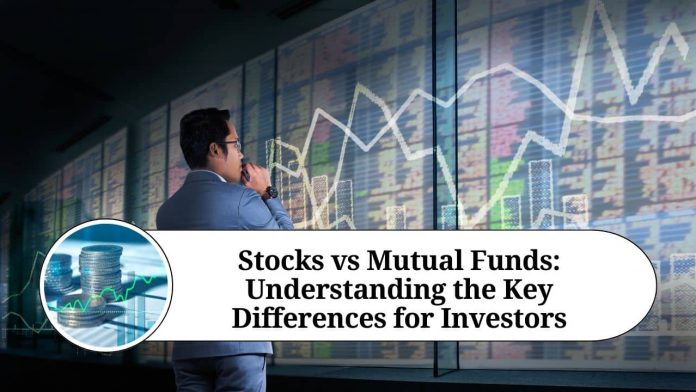Mutual Funds vs Stocks: Understanding the Key Differences
Investing in the stock market is one of the best ways to grow your wealth over time. While there are many investment options available, stocks and mutual funds are the two most popular choices. While both can offer attractive returns, they differ in terms of risk, diversification, and other factors. In this blog post, we’ll compare mutual funds and stocks to help you understand the key differences between them.
-
What are stocks?
Stocks are ownership shares in a company. When you buy a stock, you become a partial owner of the company, and your returns are tied to its performance. The value of a stock depends on a variety of factors, including the company’s financial health, industry trends, and overall market conditions.
-
What are mutual funds?
A mutual fund is a type of investment vehicle that pools money from multiple investors to buy a diversified portfolio of stocks, bonds, or other securities. Each mutual fund is managed by a professional fund manager, who uses the pooled money to buy and sell securities in accordance with the fund’s investment objectives.
-
Risk
Stocks are generally considered riskier than mutual funds, as the value of individual stocks can be highly volatile. If you invest in a single stock, you’re exposed to the risks associated with that company, such as poor financial performance, regulatory issues, or market downturns. With a mutual fund, your risk is spread across a diversified portfolio of stocks, reducing your exposure to any single company or industry.
-
Diversification
Diversification is the key to managing risk and maximizing returns. While buying individual stocks can offer the potential for high returns, it can also be risky if you’re not properly diversified. With a mutual fund, you get instant diversification, as the fund holds a portfolio of different securities across various sectors and industries.
-
Cost
The cost of investing in stocks can vary widely, depending on factors such as trading fees, commissions, and taxes. When you invest in a mutual fund, you’ll typically pay an annual management fee, which covers the costs of managing the fund. While mutual fund fees can vary, they’re generally lower than the costs associated with buying and selling individual stocks.
-
Returns
The potential returns from stocks and mutual funds can vary widely, depending on a variety of factors. Stocks offer the potential for higher returns, but they can also be riskier. Mutual funds offer a more balanced approach, with the potential for solid returns over the long term.
-
Liquidity
Liquidity refers to how easily you can buy or sell an investment. Stocks are highly liquid, as you can typically buy and sell them at any time during market hours. Mutual funds are also liquid, but they may have restrictions on when you can buy or sell shares, such as at the end of the trading day.
Conclusion:
Investing in stocks and mutual funds can both be viable options for growing your wealth over time. However, they differ in terms of risk, diversification, cost, and other factors. Ultimately, the best investment strategy for you will depend on your individual goals, risk tolerance, and investment horizon. Consider speaking with a financial advisor to help you determine the right approach for your needs.
Other Related Blogs: Section 144B Income Tax Act
Frequently Asked Questions (FAQs)
Q.What is the main difference between stocks and mutual funds?
Stocks represent ownership shares in a single company, while mutual funds pool money from multiple investors to invest in a diversified portfolio of stocks, bonds, or other securities.
Q.Which one is riskier – stocks or mutual funds?
Stocks are generally considered riskier than mutual funds as the value of individual stocks can be highly volatile. Mutual funds offer diversification, which reduces the risk of investing in a single company or industry.
Q.Do mutual funds charge fees?
Yes, mutual funds typically charge an annual management fee, which covers the costs of managing the fund.
Q.Which one is more expensive – stocks or mutual funds?
The cost of investing in stocks can vary widely, depending on factors such as trading fees, commissions, and taxes. While mutual fund fees can vary, they’re generally lower than the costs associated with buying and selling individual stocks.
Q.What is diversification, and why is it important?
Diversification means spreading your investments across different asset classes, sectors, and geographies to reduce risk. Investing in a diversified portfolio of stocks or mutual funds can help reduce the risk of investing in a single company or industry.
Q.What is the potential return on stocks and mutual funds?
The potential return on stocks and mutual funds can vary widely, depending on a variety of factors such as market conditions, company performance, and interest rates. Stocks offer the potential for higher returns, but they can also be riskier. Mutual funds offer a more balanced approach, with the potential for solid returns over the long term.
Q.Can I buy and sell stocks and mutual funds at any time?
Stocks are highly liquid, as you can typically buy and sell them at any time during market hours. Mutual funds are also liquid, but they may have restrictions on when you can buy or sell shares, such as at the end of the trading day.
Q.Should I invest in stocks or mutual funds?
The best investment strategy for you will depend on your individual goals, risk tolerance, and investment horizon. Consider speaking with a financial advisor to help you determine the right approach for your needs.




















